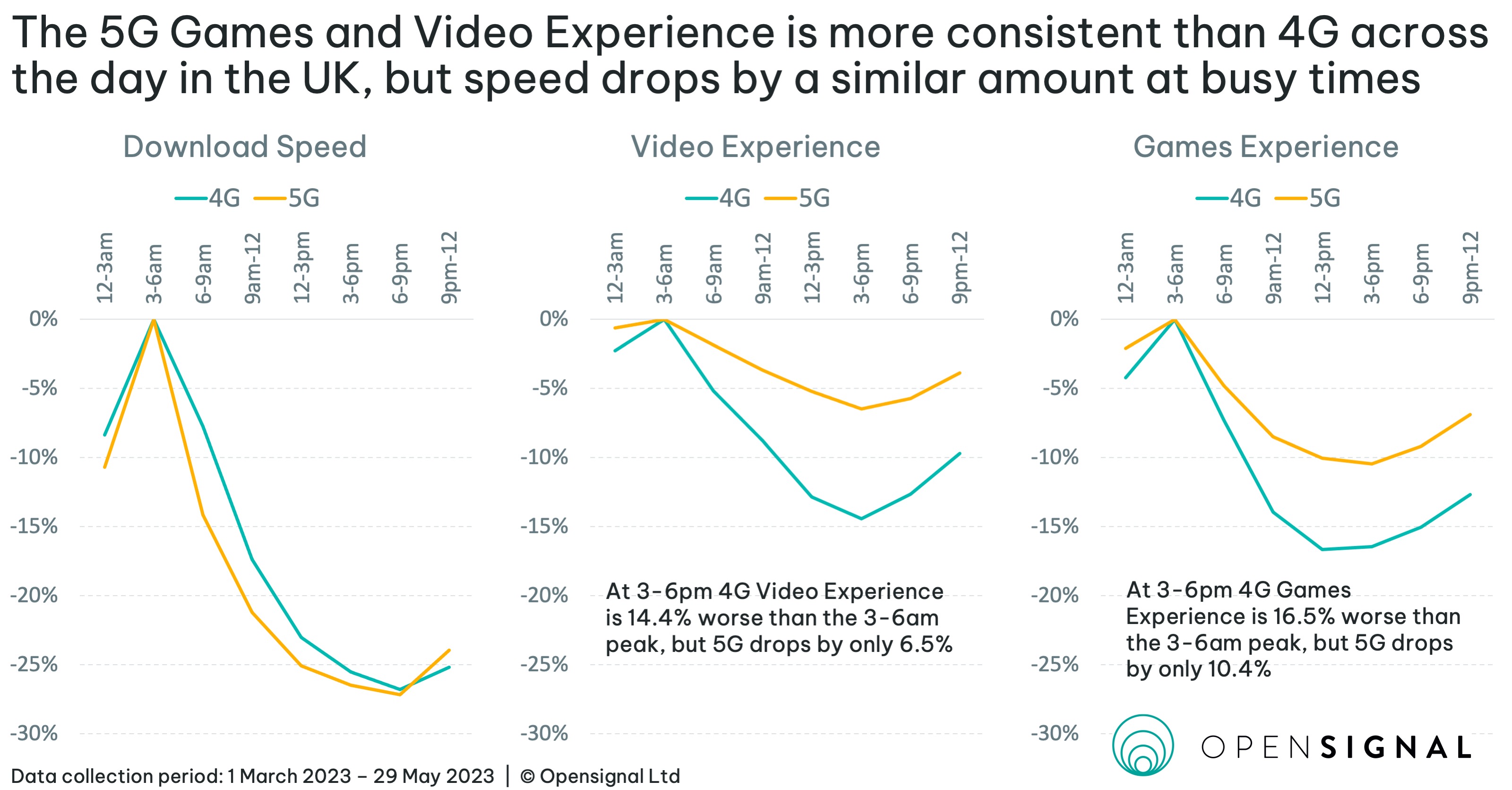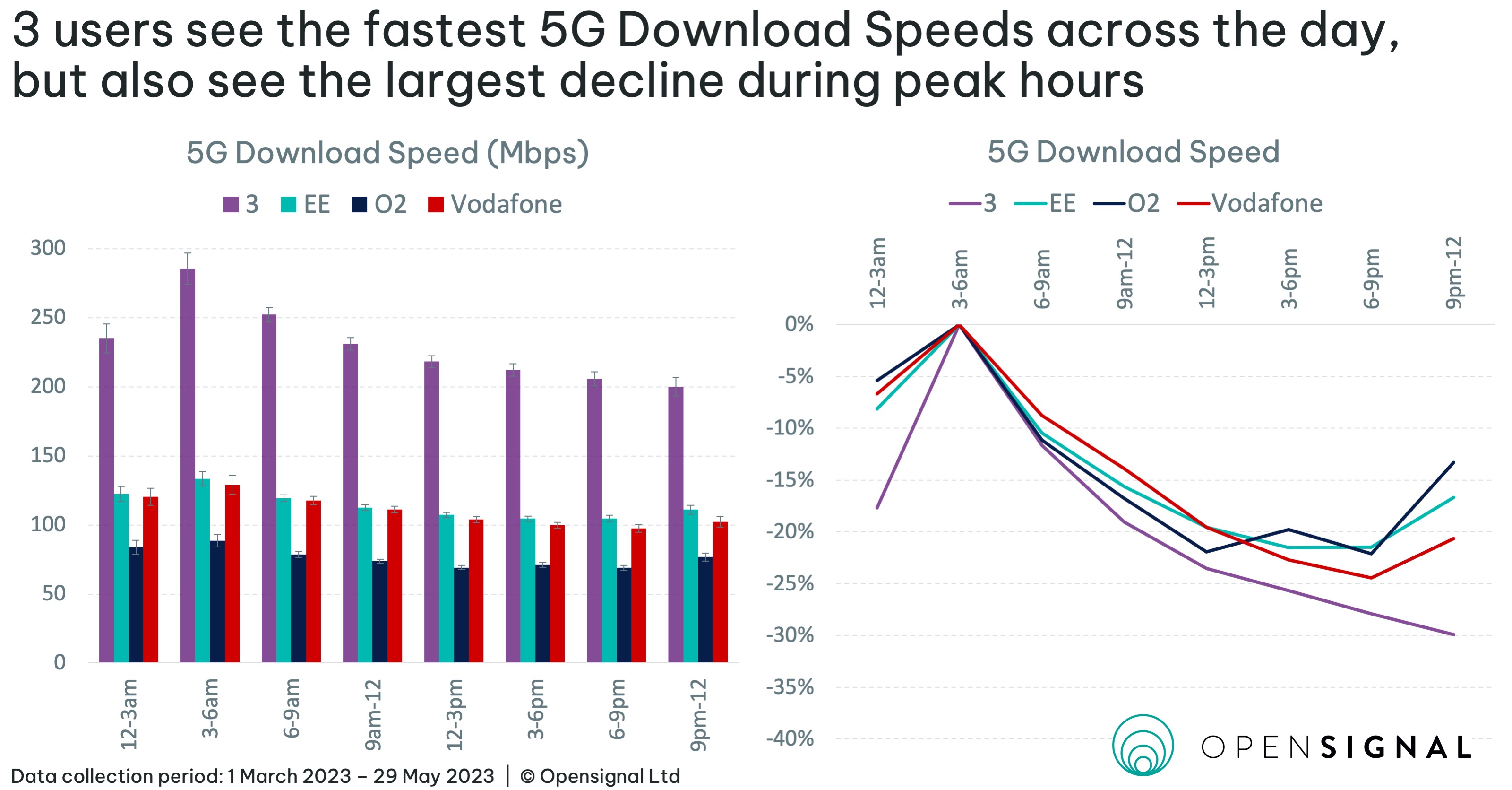Trends
5G is more consistent than 4G across all hours of the day in the UK
ust like people, mobile networks perform differently under stress. Late at night, when few people are on their phones and outside their homes, networks are lightly loaded and daily speeds at their fastest. The reverse is true during the afternoon and early evening, when the sheer volume of mobile traffic leads to greater congestion, often causing speeds to drop and the quality of experience to decline for video streaming, multiplayer gaming as well as for other apps.
Opensignal’s new analysis shows that with 5G, users’ Games and Video Experience is more consistent and drops less at busy hours of the day than when using 4G. However, while 5G download speeds used to also be more consistent than 4G back in 2022, now there is little difference with 4G, likely because of rising 5G adoption.

Here we have analyzed our U.K. users’ experience in terms of the drop in their scores for average download speeds, video experience and games experience, expressed as the percentage decline from the time of day when our users observe the best experience – in all cases the three-hour period from 3 to 6 a.m.
The 5G Games and Video Experience drops by much less than the 4G experience in the afternoon and evening when networks tend to be busy. 5G Video Experience drops by around 6% in the afternoon and evening on average, against the daily peak, compared to a decline of approximately 13% for 4G. Similarly, between 9 a.m. and 9 p.m. 5G Games Experience drops by around 10% from its early morning peak, while a larger drop of approximately 16% is seen for 4G.
We see a different pattern when we examine users’ average download speeds. 4G speeds fall by a similar amount to 5G across most of the day. In fact, 4G appears to be slightly more resilient than 5G in the morning and afternoon. However, our users on both mobile network generations see their lowest average speeds between the hours of 6 and 9 p.m.
5G services add a great deal of new spectrum capacity, especially in the 3.5GHz band, which makes 5G more able to cope with increased usage at busy hours of the day. This likely explains the Video and Games Experience trend. However, there are other factors at work that likely explain the different dynamic on download speeds. The U.K. operators have different amounts of new 5G spectrum, with 3 U.K. able to use a 100MHz 5G channel and it has a further 40MHz of similar mid-band 5G spectrum available. But Vodafone U.K., EE and O2 have approximately half that amount. But if other parts of the network, for example the backhaul links to each cell site, are congested due to rising 5G adoption this can damage users’ experience even if there is ample 5G radio spectrum.

Across the day our users in the U.K. always have a superior experience on 5G than on 4G, on all three measures of experience: average download speeds, streaming mobile video and playing multiplayer mobile games. Users’ 5G download speeds are 3.9-4.3 times faster than 4G across the three-hour periods of day Opensignal analyzed.
Similarly, our users’ 5G Video Experience is around 9.8 points higher than 4G between noon and 9 p.m., up from about 61.9 to around 71.7 points on a 100-point scale. The 4G Video Experience only rates as Very Good (68-78) at night between midnight and 6 a.m., while using 5G it is Very Good throughout the day as well. A Very Good rating means that our users are, on average, able to stream video at 1080p or better with satisfactory loading times and little stalling.
Games Experience also holds up better on 5G. Users’ 4G Games Experience only places in the Good (75-85) category between midnight and 9 a.m. before dropping down to Fair (65-75), while 5G Games Experience never falls below Good and places in the highest category — Excellent (85 or above) during the hours of 3-6 a.m.
 5G and 4G download speeds used to have a similar trend to what we now see for Video and Games Experience across hours of the day. Looking at 2022, 5G download speeds dropped by 19.4-23.4% between noon and midnight from their early morning peak of 3-6 a.m. compared with 28.3-31.1% for 4G. Yet in 2023, the 5G experience declines by a greater amount (23.9-27.2%) compared to 2022, while 4G drops by 23-26.8% — around the same as 5G.
5G and 4G download speeds used to have a similar trend to what we now see for Video and Games Experience across hours of the day. Looking at 2022, 5G download speeds dropped by 19.4-23.4% between noon and midnight from their early morning peak of 3-6 a.m. compared with 28.3-31.1% for 4G. Yet in 2023, the 5G experience declines by a greater amount (23.9-27.2%) compared to 2022, while 4G drops by 23-26.8% — around the same as 5G.

3 users observe the fastest average 5G download speeds across all hours of the day, compared to users on other operators, but they also see the greatest reduction in speed during busy times compared to the early morning (3-6 a.m.) peak. Between noon and midnight, 3 users’ speeds are 23.5-29.9% lower than their daily peak, compared with 16.7-21.5% for EE, 13.3-22.1% for O2 and 19.5-24.4% for Vodafone.
The relatively high fall in speeds 3 users see on 5G and 4G is not surprising. After all, 3 recently announced that its users on average consume 25.1GB of mobile data per month and also says that this is 3.5 times more mobile data than the U.K. industry average.

Looking at average 4G Download speeds, our EE users observe the fastest speeds across all hours of the day, while in terms of congestion there is a clear split — with EE and Vodafone users seeing relatively small declines from the speeds seen in the early morning during peak hours compared to O2 and 3 users. 3 and O2 users see similar levels of congestion until after 6 p.m. when O2’s 4G download speeds start to recover while 3’s drop to their daily lowest between 6 p.m. and 9 p.m. Open Signal




